This summer Healthy Seminarians-Healthy Church has the wonderful opportunity for Lucas Mburu, a 2nd year MATS student at CTS, to complete a part-time supervised ministry with us in partnership with Columbia Presbyterian Church. Lucas’ internship focuses on “Building Flourishing Communities,” an area where he holds great passion and aspires to carry forth after completing his studies.
Lucas has served as a pastor in the Presbyterian Church in Kenya since 2013. Currently his family (wife and two children) are living in Nairobi, Kenya. Earlier this summer, Karen Webster, HSHC executive director, sat down with Lucas and asked him to share his perspectives on health and wholeness as they relate to seminarians and clergy and what similarities and differences he observes between the US and Kenya. To Karen’s surprise, Lucas told her that clergy must have a heart condition!
 Learn more about this “heart condition” and what Lucas shared below in their Q&A session.
Learn more about this “heart condition” and what Lucas shared below in their Q&A session.
How would you define health, wellbeing, and wholeness?
Growing up I was socialized to think that the terms “health,” “wellbeing,” and “wholeness” meant the same and could be used interchangeably. A person was healthy, well, or whole if they were not sick or did not depict any sign of hurting physically. Happiness, productivity, and complaints were used by society to judge people’s health; however, health was interpreted mainly as the absence of physical sickness.
As my worldview grew, I discovered that it was naive to imagine humans as merely physical beings and to see health as solely the absence of physical sickness. Seeing health in only one way is a denial that humans are complex beings. Who we are is deeply shaped by our traditions and narratives, which give meaning to our lives and impacts our overall health and wellbeing.
What do you think it means to be a healthy seminarian?
A healthy seminarian is able to perceive and discern several things with an open mind: their calling; their environment, their time, and God’s love for them as they relate physically, emotionally, socially, rationally, and spiritually within their environment. Each of these dimensions are important indicators of health and wholeness.
What would you consider to be a healthy clergy person?
A clergy person’s environment is extremely demanding, more so than seminarians, as it drains them physically, emotionally, socially, rationally, and spiritually. Having served as a pastor, my interpretation of a healthy clergy person begins with an understanding of God’s love that was revealed in Jesus Christ. They are convinced that the love of God needs nothing to qualify it apart from what God has already done in the person of Jesus Christ. They are called into God’s on-going work, which requires love for God, neighbor, and self. They see their ministry as an intertwined relationship of these three without jeopardizing one for the other.
A healthy clergy person portrays a heart condition that embraces time for God, neighbor, and self. This heart condition should recognize the relationship between these three as interconnected, necessary, and a challenge to maintain.
What you describe sounds different from the heart conditions many of us are accustomed to thinking about (heart attacks, murmurs, leaky values, etc.). Tell me more!
This kind of heart condition involves a clergy person’s ability to see service to any of the three (God, neighbor, and self) as important because service to one cannot be done separately from the other. Healthy clergy are able to balance their commitment to each of these aspects in their lives.
Do you have any other thoughts about what it means to be a healthy seminarian and clergy person?
I have grappled with this question subconsciously, but not in detail. Sometimes I find myself in deep thought about burnout and frustrations that burdened my fellow seminarians and ministers. Sometimes I feel as if I am an unhealthy seminarian and clergy person. My traditions and narratives surrounding seminarians and clergy stereotypically imply that they enjoy a divine relationship, which privileges and burdens them in different ways than lay people. This relationship privileges them with good health irrespective of their context. I suspect this stereotypical view is shared by both clergy and laity. This view leaves clergy and seminarians devoid of wholeness because it does not recognize humanity and vulnerability. I think the health of seminarians and clergy persons needs to be prioritized during their study and while serving as ministers.
What have you observed during your time in the US as it relates to clergy health and well-being?
One major difference I have observed is the communal way in which people in my country live compared to the individual way people live in the US.
I have not seen in the US intentional time set aside for people to fellowship with their pastors nor time set aside by the congregation to care for the well-being of their clergy. Also, in Kenya we have organized fellowship between clergy that encourages the use of holidays, celebrations, and further learning.
In the US, the relationship I see between a pastor and their congregation is being played out as employees and employers. Pastoring is seen as individual work, which isolates clergy by discouraging the congregation’s involvement in the church work and prevents them from building relationships with their pastor. This employee-employer relationship does not recognize the important part that community plays in individual health, especially their social and emotional well-being.
Any final thoughts?
Though people have various ways of defining health depending on their context, this belief does not preempt the possibility of a common thread. Based on the scripture, “You shall love your God … …, and your neighbor as yourself” (Luke 10:27), I suggest that this common thread is a relationship between the community of God, neighbor, and self. The healthier the thread, the healthier one’s health. One’s vocational calling is a cyclic web from God to neighbor to self. Investing time and resources in safeguarding the health of these relationships is essential to our calling.
You can learn more about Lucas here.

 I recently attended an online plant-based cooking party led by Karen Webster, cofounder, and executive director of Healthy Seminarians Healthy Churches (HCHS). HSHC’s approach to eating seeks to enable people to live healthier lives by taking care of God’s earth (environmental), and thereby getting the proper nutrition (plant based) that God has provided for us. I initially learned about the workshop through my church’s weekly newsletter. I did not know much about plant-based cooking and wanted to begin learning about ingredients that are often used and get some recipes, so I signed up online.
I recently attended an online plant-based cooking party led by Karen Webster, cofounder, and executive director of Healthy Seminarians Healthy Churches (HCHS). HSHC’s approach to eating seeks to enable people to live healthier lives by taking care of God’s earth (environmental), and thereby getting the proper nutrition (plant based) that God has provided for us. I initially learned about the workshop through my church’s weekly newsletter. I did not know much about plant-based cooking and wanted to begin learning about ingredients that are often used and get some recipes, so I signed up online.